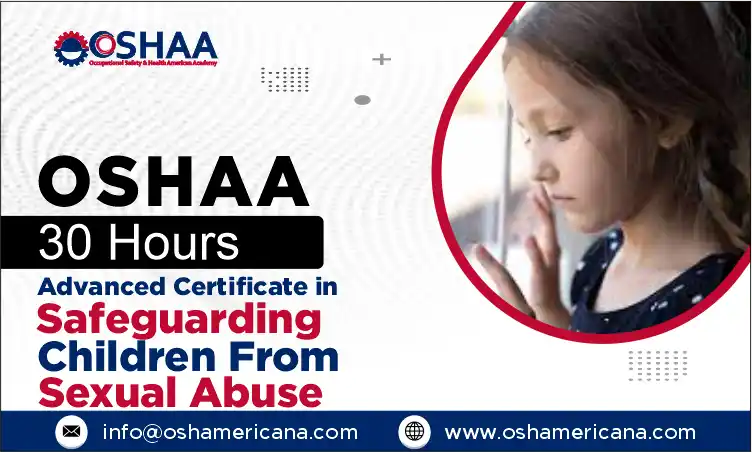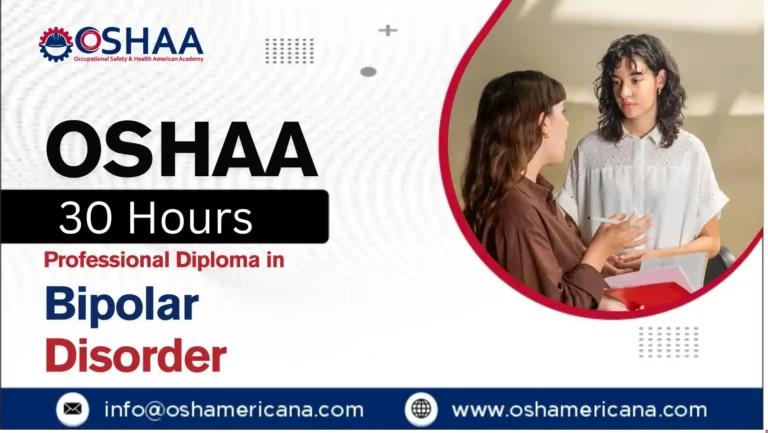Enhance your skills with the OSHAA 30-Hours Introduction to Autism Awareness and Support course. Gain vital knowledge to support individuals with autism effectively.
The OSHAA 30-Hours Introduction to Autism Awareness and Support course is a comprehensive program designed to equip participants with essential knowledge, practical strategies, and professional skills to effectively support individuals with Autism Spectrum Disorder (ASD). As autism affects communication, social interaction, and behavior in diverse ways, it is critical for professionals, caregivers, educators, and support workers to develop a strong foundation of understanding. This course has been carefully developed to ensure learners gain the insight and confidence needed to provide meaningful support, improve inclusion, and promote dignity and respect for individuals with autism across healthcare, education, and community settings.
The OSHAA 30-Hours Introduction to Autism Awareness and Support program provides an in-depth exploration of the key features of Autism Spectrum Disorder, covering the challenges individuals with autism may experience and the best practices for offering tailored care and assistance. Over the course of 30 structured hours, participants will examine effective communication strategies, behavior management approaches, and methods of creating supportive and inclusive environments. The course emphasizes not only the theoretical understanding of autism but also the practical skills required to improve the quality of life for individuals on the spectrum. By focusing on evidence-based practices, learners will be able to deliver safe, compassionate, and effective support that aligns with professional standards and global compliance requirements.
One of the primary benefits of the OSHAA 30-Hours Introduction to Autism Awareness and Support course is its emphasis on raising awareness and breaking down the barriers often caused by misconceptions about autism. Misunderstandings can lead to exclusion, inadequate support, and missed opportunities for growth. This course addresses these challenges directly, giving learners the ability to recognize and respond to the unique needs of individuals with autism while fostering inclusion and respect. By learning to tailor support approaches based on individual strengths and challenges, participants will be better equipped to ensure positive outcomes in personal, educational, and professional contexts.
Professionals in healthcare, education, residential care, and community services will find the OSHAA 30-Hours Introduction to Autism Awareness and Support course especially valuable for enhancing their professional development. Caregivers and family members will also benefit from the practical insights and strategies provided, allowing them to build stronger, more supportive relationships with individuals on the spectrum. The knowledge gained through this training not only improves the quality of care but also contributes to broader goals of social inclusion, workplace safety, and compliance with international best practices.
By completing the OSHAA 30-Hours Introduction to Autism Awareness and Support program, participants will gain confidence in their ability to interact effectively with individuals with autism, promote inclusive environments, and support independence and well-being. This certification demonstrates a professional commitment to advancing autism awareness, improving care standards, and fostering a culture of empathy and understanding. Ultimately, the course prepares learners to make a lasting positive impact on individuals with autism, helping them live fuller, more independent, and empowered lives while strengthening the professional skills of those who support them.
OSHAA 30-Hours Introduction to Autism Awareness and Support
To enroll in the OSHAA 30-Hours Introduction to Autism Awareness and Support, learners are expected to meet the following criteria:
1. Age Requirement
- Applicants must be at least 18 years of age to enroll in the OSHAA 30-Hours Introduction to Autism Awareness and Support course.
- This minimum age requirement ensures participants have the maturity and responsibility to understand the sensitive nature of supporting individuals with autism.
- The course is designed for adult learners who are preparing for professional roles or advancing their careers in healthcare, education, and social services.
2. Educational Background
- A minimum of a high school diploma or equivalent is recommended for enrolling in the OSHAA 30-Hours Introduction to Autism Awareness and Support program.
- Higher education in fields such as healthcare, psychology, special education, or social work is considered an advantage as it enhances the learner’s ability to apply course concepts effectively.
- The course is structured to accommodate both professionals with academic experience and learners who are new to the subject but committed to developing autism awareness and support skills.
3. Work Experience
- Prior work experience in healthcare, education, or caregiving is not mandatory for the OSHAA 30-Hours Introduction to Autism Awareness and Support course, making it accessible to a wide range of learners.
- However, professionals currently working in hospitals, schools, community care, or residential support services may find the content highly relevant and directly applicable to their roles.
- Learners with experience in supporting individuals with intellectual disabilities or mental health conditions will gain advanced strategies to strengthen their existing skills.
4. English Proficiency
- Participants enrolling in the OSHAA 30-Hours Introduction to Autism Awareness and Support must have the ability to read, write, and communicate effectively in English.
- Proficiency in English ensures learners can fully engage with course materials, understand regulatory requirements, and apply best practices in real-world care settings.
- Since the OSHAA 30-Hours Introduction to Autism Awareness and Support course emphasizes international standards and global applicability, English fluency supports clear communication and professional development across diverse workplaces.
The OSHAA 30-Hours Introduction to Autism Awareness and Support eligibility requirements have been carefully designed to ensure that learners are adequately prepared to succeed in the program while maintaining professional training standards. Meeting these criteria allows participants to maximize the benefits of the course, gain essential knowledge, and demonstrate a commitment to advancing autism awareness, professional growth, and workplace inclusion.
Study Units
Learning Outcomes
Introduction to Autism Spectrum Disorder (ASD) (3 Hours)
- Understand the core characteristics and symptoms of Autism Spectrum Disorder.
- Recognise the different levels of autism and their impact on individuals’ daily lives.
- Identify early signs and symptoms of ASD for early intervention.
- Understand the potential causes and risk factors of autism.
- Gain knowledge of the diagnostic criteria for autism and the importance of early identification.
Social and Communication Challenges in Autism (4 Hours)
- Understand the social interaction difficulties experienced by individuals with autism.
- Learn about communication challenges, including both verbal and non-verbal communication.
- Identify strategies for improving social interactions and communication with individuals on the spectrum.
- Explore various communication methods, including augmentative and alternative communication (AAC) systems.
- Develop the ability to recognise and adapt to different communication needs of individuals with autism.
Understanding Sensory Processing and Behaviour in Autism (4 Hours)
- Understand how sensory processing issues affect behaviour in individuals with autism.
- Recognise common behavioural traits associated with autism.
- Identify triggers that may cause sensory overload and behavioural issues.
- Learn strategies to support individuals in managing sensory processing difficulties.
- Develop skills to address challenging behaviours with positive reinforcement techniques.
Person-Centred Care for Individuals with Autism (3 Hours)
- Understand the principles of person-centred care and how they apply to autism support.
- Learn to develop individualised support plans based on the preferences and needs of the person with autism.
- Understand the importance of autonomy, choice, and empowerment in supporting individuals with autism.
- Explore ways to engage individuals in decision-making processes related to their care.
- Learn how to create a tailored approach to care that respects the dignity of individuals with autism.
Creating an Inclusive Environment for Autism Support (4 Hours)
- Learn how to adapt environments to meet the sensory and social needs of individuals with autism.
- Understand the importance of structure and routine in creating a supportive environment.
- Explore strategies for integrating sensory-friendly spaces and sensory regulation tools.
- Learn how to promote inclusion in both educational and community settings.
- Develop an understanding of the significance of visual supports, social stories, and other aids in autism support.
Supporting Autism in Educational Settings (4 Hours)
- Understand the educational needs of children with autism in schools.
- Learn how to support children with autism in the classroom, including individualised teaching strategies.
- Gain knowledge of Individual Education Plans (IEPs) and how to implement them effectively.
- Explore techniques for facilitating social inclusion and peer relationships for students with autism.
- Learn how to adapt teaching materials and classroom environments to support individuals with autism.
Supporting Autism in the Workplace (5 Hours)
- Understand the unique challenges that individuals with autism may face in the workplace.
- Learn strategies for creating a supportive and inclusive work environment for employees with autism.
- Explore reasonable accommodations and adjustments that can be made to assist employees with autism.
- Understand how to foster an inclusive culture within a team or organisation.
- Learn how to support individuals with autism in managing work-related stress and anxiety.
Supporting Families and Carers of Individuals with Autism (4 Hours)
- Understand the challenges faced by families and carers of individuals with autism.
- Learn how to provide emotional and practical support for families.
- Gain knowledge of available resources and services for families and carers of individuals with autism.
- Explore ways to provide support for siblings and extended family members.
- Develop self-care strategies for families and caregivers to prevent burnout and maintain wellbeing.
The OSHAA 30-Hours Introduction to Autism Awareness and Support course provides participants with critical knowledge, professional skills, and practical strategies to effectively support individuals with Autism Spectrum Disorder (ASD) across healthcare, education, and community settings. This program is globally relevant, aligning with international best practices and regulatory compliance requirements. It enhances the professional capabilities of learners while promoting inclusivity, safety, and positive developmental outcomes for individuals with autism. Designed for professionals, caregivers, and organizations, the course strengthens both individual competence and institutional standards, contributing to professional development, improved service delivery, and a culture of empathy, safety, and compliance.
- Enhanced Knowledge of Autism Spectrum Disorder
- Participants gain an in-depth understanding of the characteristics, challenges, and needs of individuals with autism.
- The course equips learners to identify diverse manifestations of ASD in professional and caregiving contexts.
- This knowledge enables professionals to apply evidence-based practices in support strategies.
- Regulatory Compliance and Professional Standards
- The OSHAA 30-Hours Introduction to Autism Awareness and Support ensures learners align with OSHA, healthcare, and education compliance frameworks.
- Training helps organizations demonstrate adherence to global standards of care.
- Compliance knowledge reduces risks of negligence and enhances institutional accountability.
- Improved Communication and Interaction Skills
- Participants develop effective communication strategies tailored to individuals with autism.
- Training enhances the ability to build trust and rapport while respecting personal boundaries.
- These skills improve service quality in healthcare, education, and community support.
- Promotion of Inclusive Practices
- The course emphasizes the importance of inclusion and accessibility for individuals with autism.
- Learners are trained to foster environments that respect dignity, equality, and independence.
- Inclusivity enhances organizational reputation and aligns with global diversity standards.
- Workplace Safety and Well-being
- Participants learn safe and supportive practices when working with individuals with challenging behaviors.
- Training reduces workplace incidents and ensures the well-being of both staff and service users.
- The course supports OSHA workplace safety standards in healthcare and education environments.
- Professional Development and Career Growth
- Completing the OSHAA 30-Hours Introduction to Autism Awareness and Support strengthens professional qualifications.
- It opens career opportunities in healthcare, education, counseling, and community services.
- The course serves as a stepping stone for advanced certifications and leadership roles.
- Cost Savings and Operational Efficiency
- Trained professionals minimize errors in handling individuals with autism, reducing institutional risks.
- Improved support strategies lead to better long-term outcomes, lowering costs for corrective interventions.
- Operational efficiency is enhanced through structured, compliant care practices.
- Leadership and Team Collaboration Skills
- The program develops leadership capabilities in managing autism support programs.
- Learners gain skills in teamwork, collaboration, and guiding colleagues in best practices.
- These competencies prepare participants to take on supervisory or coordination roles.
- Emergency Preparedness and Risk Management
- The OSHAA 30-Hours Introduction to Autism Awareness and Support equips learners with skills to manage crises.
- Participants gain strategies for de-escalation and safe handling of emergency situations.
- Strong risk management reduces liability and ensures safety compliance.
- Enhanced Caregiver and Family Support
- Professionals learn how to engage families in care planning and decision-making.
- Training fosters empathy, patience, and effective collaboration with caregivers.
- Family-centered approaches lead to improved quality of life for individuals with autism.
- Promotion of Mental Health and Emotional Well-being
- The course emphasizes the emotional and psychological needs of individuals with autism.
- Participants learn strategies to reduce anxiety, frustration, and stress for service users.
- Supporting mental well-being enhances long-term outcomes and independence.
- Global Recognition and Career Mobility
- The OSHAA 30-Hours Introduction to Autism Awareness and Support is designed to meet international standards.
- Learners benefit from a globally recognized certification that strengthens career prospects.
- The qualification increases mobility across sectors such as healthcare, education, and social services.
- Continuous Improvement and Innovation
- The course introduces learners to the latest research and developments in autism awareness.
- Participants are encouraged to apply innovative strategies in professional practice.
- This fosters a culture of continuous improvement within organizations.
- Organizational Reputation and Stakeholder Confidence
- By employing staff trained in autism awareness, organizations enhance credibility.
- Training ensures services are inclusive, ethical, and compliant with international frameworks.
- Strong stakeholder confidence contributes to organizational growth and community trust.
- Building a Culture of Empathy and Respect
- The OSHAA 30-Hours Introduction to Autism Awareness and Support promotes compassionate, respectful approaches.
- Learners develop awareness of cultural, social, and individual differences.
- A culture of empathy strengthens relationships and improves overall service outcomes.
In conclusion, the OSHAA 30-Hours Introduction to Autism Awareness and Support course delivers extensive benefits that extend beyond professional skill development. It enhances regulatory compliance, fosters inclusive practices, and equips learners with the ability to provide high-quality support for individuals with autism. By completing this course, professionals not only advance their careers but also contribute to safer, more inclusive workplaces and communities, ensuring that individuals with autism are supported with dignity, respect, and care.
The OSHAA 30-Hours Introduction to Autism Awareness and Support course is specifically designed for professionals, organizations, and stakeholders seeking to strengthen their expertise in autism awareness, compliance, and inclusive practice. This globally recognized qualification is relevant to educators, healthcare providers, social workers, and corporate organizations who aim to meet OSHA safety compliance, enhance service delivery, and support individuals with autism effectively. The program provides advanced knowledge, professional development, and practical strategies, ensuring learners gain essential competencies aligned with international standards of workplace safety, inclusivity, and regulatory compliance.
- Educators and Teaching Professionals
- Teachers, special education staff, and school administrators play a critical role in supporting students with autism.
- The OSHAA 30-Hours Introduction to Autism Awareness and Support equips educators with strategies to create inclusive classrooms and adapt teaching methods.
- Participants learn how to meet global education standards while promoting OSHA-aligned safe learning environments.
- This course strengthens their ability to foster communication, engagement, and positive learning outcomes.
- Healthcare Professionals
- Nurses, doctors, therapists, and allied health practitioners benefit directly from specialized autism training.
- The OSHAA 30-Hours Introduction to Autism Awareness and Support enhances clinical skills in patient care and safety management.
- Participants learn effective methods for communication, behavior management, and family collaboration.
- Compliance with OSHA standards ensures safe, ethical, and patient-centered healthcare practices.
- Social Workers and Community Support Staff
- Social service professionals often provide direct support to individuals and families affected by autism.
- The OSHAA 30-Hours Introduction to Autism Awareness and Support develops skills for advocacy, case management, and resource allocation.
- Training strengthens their ability to promote inclusion, safeguard vulnerable populations, and ensure community safety.
- OSHA compliance knowledge supports risk management and professional accountability in service delivery.
- Corporate Leaders and HR Professionals
- Managers, HR officers, and corporate trainers need autism awareness to implement inclusive workplace policies.
- The OSHAA 30-Hours Introduction to Autism Awareness and Support prepares organizations to create neurodiverse-friendly workplaces.
- Participants gain tools to support employee well-being, reduce workplace incidents, and enhance safety culture.
- Training aligns with OSHA compliance, boosting organizational reputation and operational standards.
- Safety Managers and Compliance Officers
- Professionals responsible for workplace safety benefit from integrating autism awareness into safety protocols.
- The OSHAA 30-Hours Introduction to Autism Awareness and Support equips them with knowledge to manage risks and foster safe environments.
- Training reduces the likelihood of incidents involving individuals with autism in educational, healthcare, or community spaces.
- OSHA compliance ensures that organizations meet international workplace safety standards.
- Parents and Caregivers of Individuals with Autism
- Family members and caregivers require structured knowledge to provide effective support at home and in the community.
- The OSHAA 30-Hours Introduction to Autism Awareness and Support empowers caregivers with coping strategies, behavior management techniques, and communication skills.
- Participants gain confidence in ensuring safety, well-being, and independence for individuals with autism.
- OSHA-aligned practices reinforce safe environments within domestic and community settings.
- Policy Makers and Government Officials
- Government representatives overseeing healthcare, education, and disability services benefit from autism awareness training.
- The OSHAA 30-Hours Introduction to Autism Awareness and Support strengthens policy frameworks for inclusive education and public safety.
- Officials gain insight into OSHA compliance, ensuring that regulations address safety, accessibility, and quality care.
- Training supports evidence-based decision-making for national and international development programs.
- Nonprofit and NGO Professionals
- Staff working in nonprofit and humanitarian organizations often engage with vulnerable populations, including individuals with autism.
- The OSHAA 30-Hours Introduction to Autism Awareness and Support equips NGO workers with culturally sensitive support strategies.
- Training enhances their capacity to deliver inclusive, safe, and compliant programs.
- OSHA-aligned practices improve organizational credibility and international recognition.
- Counselors, Psychologists, and Mental Health Professionals
- Mental health specialists require autism-specific training to deliver effective psychological support.
- The OSHAA 30-Hours Introduction to Autism Awareness and Support develops therapeutic approaches that are safe, ethical, and compliant.
- Participants learn to reduce anxiety, promote emotional well-being, and support social integration.
- OSHA-aligned frameworks enhance patient safety, confidentiality, and professional practice.
- Students and Aspiring Professionals
- Individuals pursuing careers in healthcare, education, social work, and related fields benefit from early autism awareness training.
- The OSHAA 30-Hours Introduction to Autism Awareness and Support enhances employability and prepares learners for professional roles.
- Students gain foundational skills in inclusivity, compliance, and workplace safety standards.
- The course builds a strong pathway to advanced certifications and global career opportunities.
In conclusion, the OSHAA 30-Hours Introduction to Autism Awareness and Support course provides essential training for educators, healthcare providers, social workers, corporate leaders, caregivers, and organizational stakeholders. By completing this program, participants across all sectors gain advanced professional knowledge, OSHA-aligned compliance skills, and globally recognized certification. This ensures enhanced workplace safety, inclusive practices, and operational excellence, making the OSHAA 30-Hours Introduction to Autism Awareness and Support a vital qualification for anyone committed to advancing autism awareness, professional development, and international safety standards.







